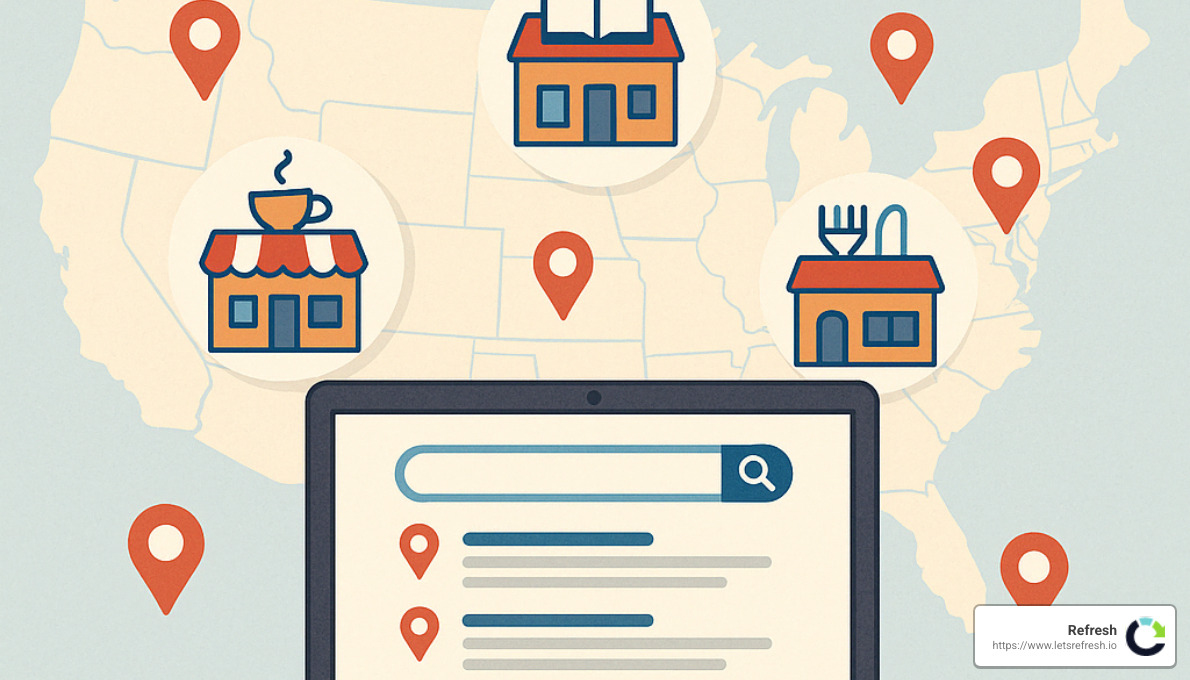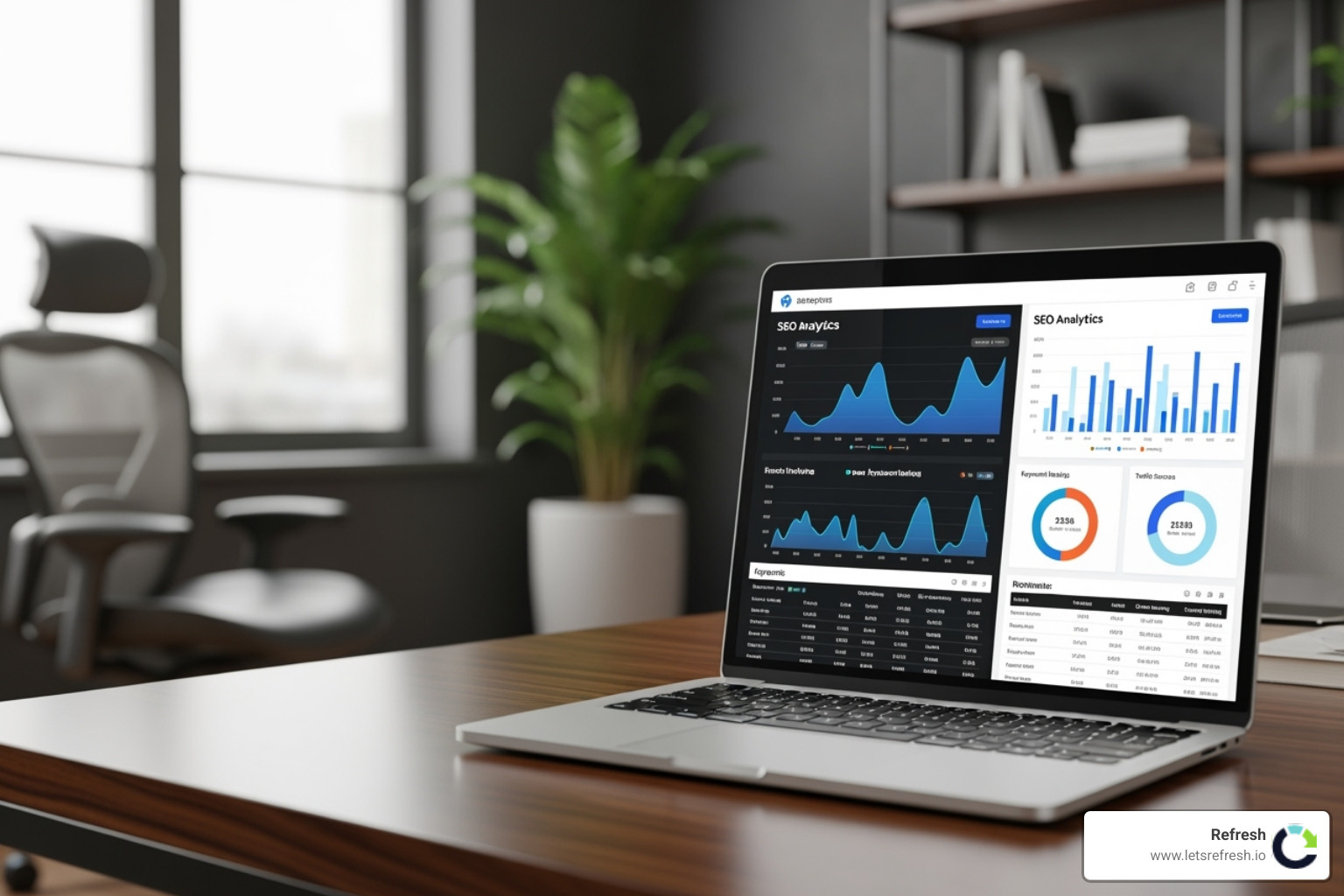July 24, 2025
Why SEO for Local Business Matters Today
SEO for local business means optimizing your online presence to show up in local search results, helping more nearby customers find you.
If you're short on time—here's the quick version:
- What is it? Improving your visibility when people search for local products or services online.
- Why does it matter? Nearly half (46%) of all Google searches seek local businesses or services. 76% of people who search locally visit a store within 24 hours.
- Key components: Google Business Profile, consistent NAP (Name, Address, Phone), online reviews, local keywords, and citations.
You probably already know that local customers matter. But you might not realize just how dramatically localized search shapes their decisions. A whopping 97% of people search online to find local businesses, and 50% of those local searches result in an actual store visit within a single day.
That's why mastering SEO for local business isn't an optional marketing tactic—your growth.
My name is Alexander Palmiere, and as the founder of Refresh Digital Strategy, I've spent years helping businesses just like yours grow through targeted SEO for local business strategies. With over 200 successful website launches and extensive experience boosting online visibility, I've learned exactly what drives meaningful local traffic and turns it into real-world sales.
Here's a visual summary that highlights core aspects of local SEO:
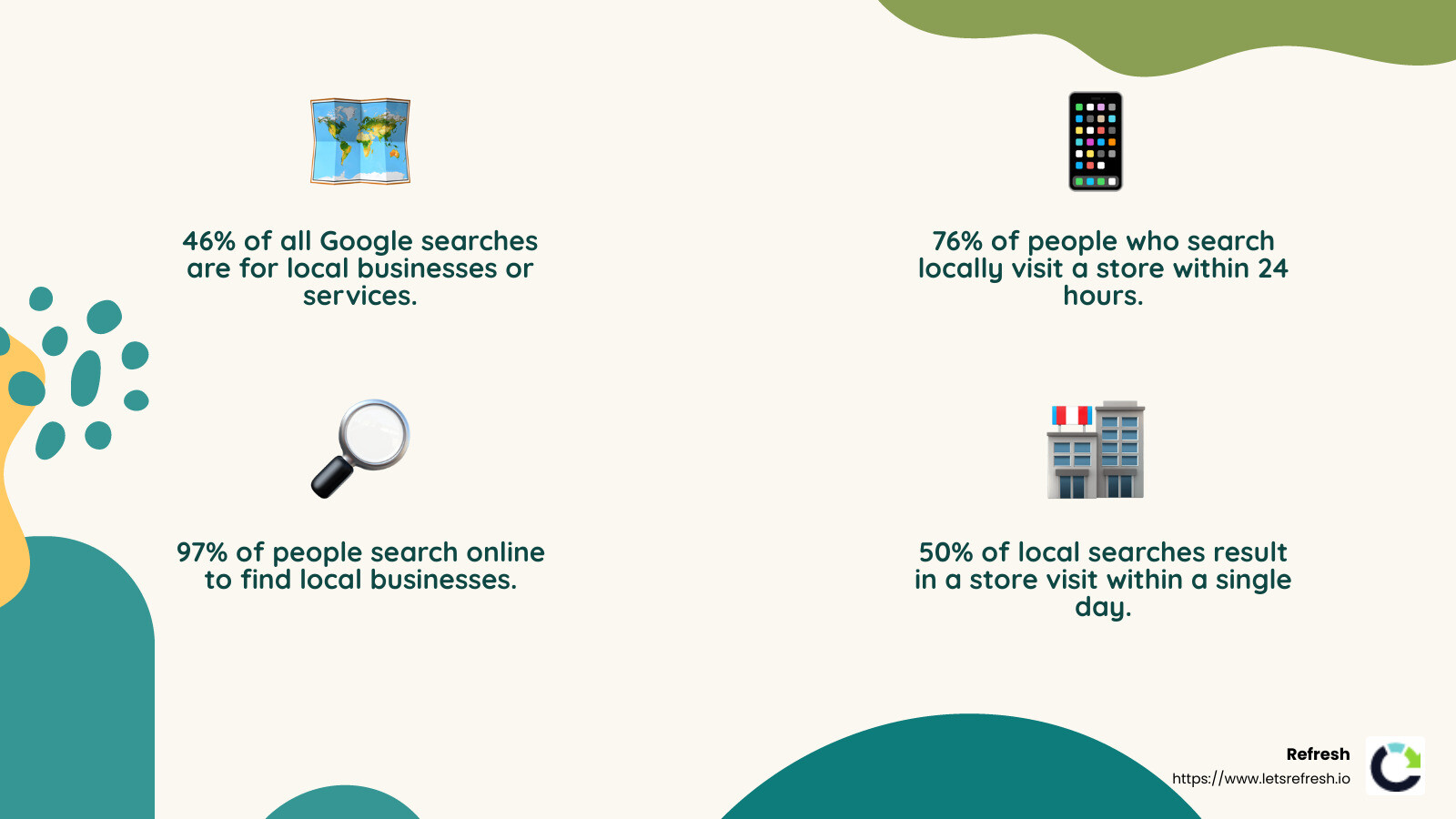
Seo for local business terms to remember:
- affordable seo company for small businesses
- seo marketing for small business
- seo for service based business
Understanding SEO for Local Business
When you're running a small business, you've probably heard the term SEO for local business tossed around—but what exactly does it mean? Simply put, local SEO means tweaking your online presence so more customers nearby find you when they search online. Think about it: someone in Pittsburgh or Cleveland searches Google for a plumber, bakery, or coffee shop "near me," and your business pops right up. That's local SEO in action.
Local SEO zeros in on boosting your visibility specifically in local searches. When people are looking for businesses, products, or services close to home, Google presents them with localized results custom to their immediate location. It's all about connecting folks effortlessly with the businesses they need—right around the corner.
When you search locally, you'll often notice a few key areas where businesses pop up prominently. First, there's Google Maps and the Local Pack—those handy map-based listings you see right at the top of a search. Next, there are the local organic search results—those traditional blue clickable links right underneath the map. Finally, there's your Google Business Profile, which shows up when someone searches specifically for your business name or related local services.
These three areas matter enormously. If your business isn't appearing prominently there, you're missing out on customers who could walk through your door today.
How Does Local SEO Differ from Traditional SEO?
If you're familiar with traditional SEO (search engine optimization), you might wonder what makes local SEO different. While they share some basics—like quality content and authoritative backlinks—there are important differences in focus and approach.
Traditional SEO usually targets broader audiences, often national or even global. But local SEO is laser-focused on attracting customers from a specific geographic area. Instead of competing with massive websites on general keywords, local SEO prioritizes location-based keywords to connect with people nearby.
Here's a practical example: a bakery using traditional SEO might target broad keywords like "best cupcakes recipe" or "how to bake bread." But if you're focused on local SEO, you'd prioritize terms like "best cupcakes in Charlotte" or "bakery near me" to target hungry locals exactly when they're ready to buy.
Local SEO also heavily depends on factors like proximity (how close your business is to the searcher's location), relevance (how closely your business matches the search terms), and prominence (your business's reputation and authority online). Google takes all of these into account when deciding which businesses to show first.
This is why having consistent NAP (Name, Address, Phone) information across your website and online directories is so crucial. Google wants to be certain your business information is accurate and reliable before recommending you to local searchers.
In fact, Google's local search algorithm specifically evaluates your business based on those three primary factors: relevance, distance, and prominence. As Google itself notes, regular SEO practices still matter, meaning you'll want to follow standard SEO best practices alongside your local efforts.
"46% of all searches in Google have local intent." – Backlinko
Nearly half of all Google searches have local intent—that's huge! If you're not prioritizing SEO for local business, you're essentially missing out on half the potential customers searching online. The bottom line is clear: local SEO isn't just a nice-to-have, it's an absolute must-have for small businesses hoping to compete and thrive.
Ready to dive deeper into crafting your local SEO strategy? You can learn more about the next steps here: Local SEO Strategy.
Why Local SEO Matters for Small Businesses
If you run a small business in Pittsburgh, Cleveland, or Charlotte, SEO for local business isn't just another marketing buzzword—it's your direct line to your neighborhood. Let's explore why it’s essential for your growth and how it can level the playing field against bigger brands.
1. Increased Visibility Where It Counts
Imagine someone craving pizza in Cleveland or desperately needing a plumber in Pittsburgh. They're not casually browsing—they are ready to buy. Local SEO places your business right in front of those customers precisely when they're looking for your services. Unlike generic advertising, local search puts your business in front of people already motivated to purchase.
2. Level Playing Field with Larger Competitors
Ever feel like it's impossible to compete with giant corporations? Good news: local SEO shifts the balance in your favor. You may not have national budgets, but with a carefully optimized Google Business Profile, customer reviews, and consistent local citations, you can outrank even the biggest brands in your community.
Think about it: a family-owned plumbing business in Pittsburgh can appear higher in local search results than a national chain simply by implementing these key strategies. It's your chance to shine locally—and win customers who prefer supporting community businesses.
3. Mobile Search Dominance
Here's a scenario we all recognize: you're out and about, and you need to find something quickly. You pull out your phone and search "coffee shop near me." Everyone does it. In fact:
- 82% of smartphone users perform "near me" searches.
- Mobile "near me" searches surged by 136% last year alone.
- A whopping 78% of local mobile searches lead to an actual offline purchase.
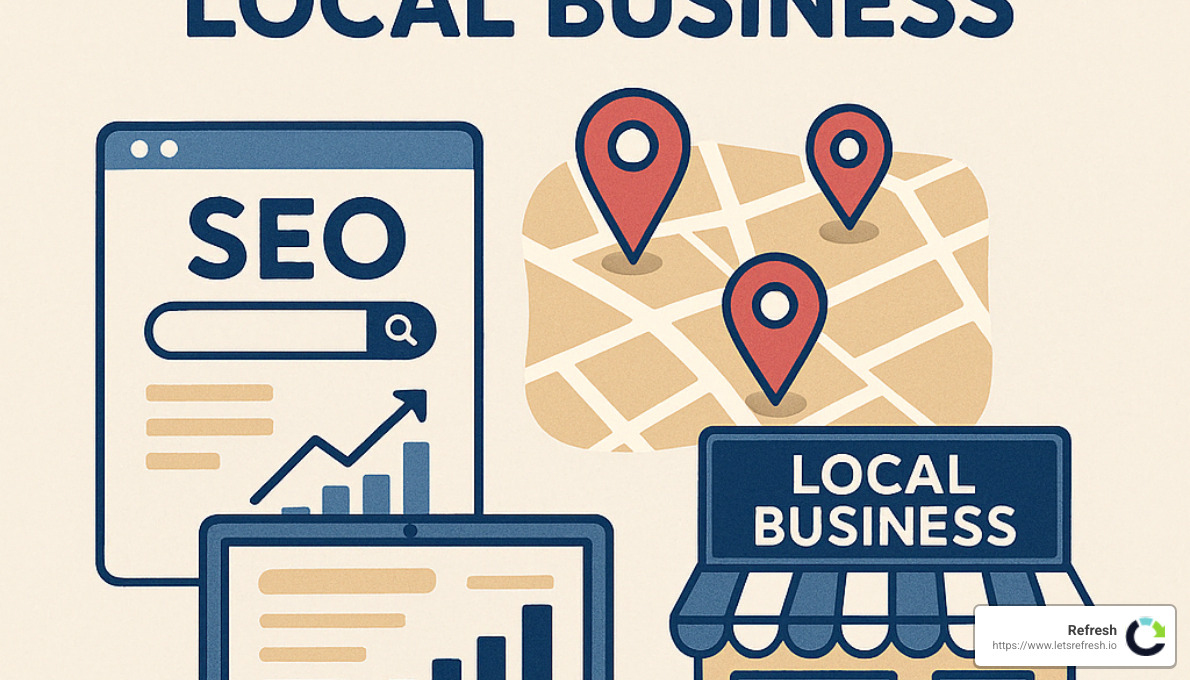
Clearly, we can't underestimate the power of being visible in these spontaneous mobile searches. Optimizing your site and online listings for mobile ensures you're front and center exactly when potential customers need you most.
4. Impressive ROI
Let's talk budget. Traditional advertising—like billboards, print ads, or radio spots—can be expensive, and it's hard to measure results. Local SEO, on the other hand, delivers measurable returns and impressive cost-effectiveness:
Local SEO generates an ROI of 500% or higher for 40% of campaigns. Even better, 50% of people who perform a local search visit a store within one day, and 28% make a purchase.
Unlike traditional marketing, SEO keeps working round-the-clock, connecting you with local customers exactly when they're ready to buy. Real results, real returns, and real community connections—sounds good, doesn't it?
5. Voice Search Impact
"Hey Siri, where can I get great tacos near me?" Voice searches have become an everyday habit for many people. Over 20% of all mobile Google searches are voice queries, and these often involve local intent.
Since voice searches are conversational—like asking a friend—optimizing your content for natural language questions is key. By doing so, your business can capture even more local customers looking for exactly what you offer.
Local SEO provides a powerful opportunity for small businesses like yours. Standing out locally, using mobile and voice searches, and earning impressive ROI are just a few reasons why SEO for local business is essential for your success.
Want to know more about how Refresh can help boost your local SEO strategy? Check out our detailed guide on SEO Marketing for Small Business.
Key Components of a Successful Local SEO Strategy
A successful SEO for local business strategy isn't just one or two quick fixes—it's a combination of elements working seamlessly together. Think of it like baking a cake: miss one ingredient, and it won't taste quite right. Let's explore the ingredients you need to ensure your business stands out locally:
First and foremost, optimize your Google Business Profile. This free and powerful tool from Google helps your business appear prominently in local search results, Maps, and Google's Knowledge Panel. By accurately filling out your profile—categories, hours, services, contact info, and engaging photos—you instantly boost your visibility to nearby customers.
Next, focus on maintaining NAP Consistency—Name, Address, and Phone number. It's like your company's digital fingerprint. Ensuring your NAP details match exactly across your website, directories, and social media platforms helps build trust with both customers and search engines. Even slight discrepancies (like using "Street" on one site and "St." on another) can confuse Google and hurt your rankings.
Managing your Online Reviews is also crucial. Reviews aren't just testimonials—think of them as powerful trust signals. Positive customer reviews help potential customers see you're reliable. Encouraging happy customers to leave reviews and thoughtfully responding (even to negative ones—hey, nobody’s perfect!) boosts your credibility and positively impacts your local search rankings.
You’ll also want to strategically use Local Keywords throughout your website content. This means incorporating location-specific terms like "Pittsburgh coffee shop" or "Charlotte plumber" into your pages, meta tags, headers, and URLs. This tells search engines exactly where you serve customers and helps you rank higher in local searches.
Another key element is building your Local Citations, which are simply mentions of your business across the web on directories like Yelp, Yellow Pages, or local Chamber of Commerce sites. These citations validate your business information and improve your local credibility, making your business appear more trustworthy in Google's eyes.
Don't overlook On-Page SEO Optimization either—this includes fine-tuning your website structure, headings, and content to clearly communicate to search engines exactly what you offer and where you operate. It’s the digital equivalent of hanging a clear "We're Open!" sign outside your store.
In addition, Local Link Building—earning backlinks from other reputable local websites—signals to Google that you're an active, trusted part of your community. Whether through sponsoring local events, joining associations, or guest blogging for community blogs, these local connections help reinforce your authority.
Creating Locally Relevant Content also makes a big difference. Share blog posts highlighting community events, local guides, or news relevant to your audience. This type of content doesn't just attract visitors—it's also shareable, helping you earn even more local backlinks and boosting your SEO further.
Since most people search locally using their smartphones, ensuring your website has great Mobile Optimization is essential. If your website is slow or hard to steer on a phone, potential customers will quickly move on. Make sure your site loads fast, looks clean, and provides an easy experience to keep mobile visitors happy.
Finally, don't forget Analytics and Tracking. After all, you can't improve what you don't measure. Using tools like Google Analytics and Google Search Console, you'll understand how visitors interact with your website, track your rankings, and identify what's working (and what's not). Regularly reviewing this data lets you adjust your strategy and continually optimize your approach.
When all these elements harmonize, your SEO for local business strategy becomes incredibly powerful, driving consistent local traffic, increased visibility, and more sales. And if you need a hand putting these ingredients together, we're here at Refresh to help you bake the perfect local SEO cake!
Optimizing Your Google Business Profile
Your Google Business Profile is often the first impression local customers have of your business—and we all know how important first impressions are! When people search for your specific business or the products and services you offer locally, your Google Business Profile appears in Google Maps, local search results, and the Knowledge Panel on the side of search results pages.
Getting this profile right is one of the best things you can do to boost your seo for local business visibility. Follow these simple steps to make sure your profile shines and attracts more local customers.
Claiming and Verifying Your Profile
First things first—claiming your Google Business Profile means letting Google know that you own or manage your business listing.
Start by visiting business.google.com. Sign into your Google account (or create one if you don't have it yet—it’s quick and easy, promise!). Enter your business name, making sure it's accurate and matches exactly how it appears elsewhere online.
Next, Google will ask you to verify your business. This is usually done through a postcard sent to your business address, but sometimes Google's verification happens by phone or email. This step is critical—without verification, your profile can't fully show up in local search results, and you won't have complete control over your information.
Providing Complete and Accurate Information
Once your profile is verified, it's time to fill out your details thoroughly and thoughtfully. Your goal here is to provide Google (and potential customers!) with clear, accurate information that matches all your other online mentions and citations. Consistency is key.
Here’s what to focus on:
Use your real business name without trying to stuff in any extra keywords or location terms. (Google does not like that at all.)
Choose the right business categories carefully. Pick one primary category that's the closest fit, then add additional secondary categories if they make sense.
Double-check your address matches exactly how you've listed it everywhere else online. If you visit customers at their locations, clearly define your service area.
Make sure your phone number is a local number (skip the toll-free line if you can) and matches other listings.
Provide accurate hours of operation, including special holiday hours. (Don't leave a customer guessing if you're open for Thanksgiving coffee runs!)
Link clearly to your website, ideally your homepage or a relevant location-specific landing page.
Fill out your products and services section with clear descriptions—this makes it easy for customers to quickly see exactly what you offer.
Include helpful attributes like "free Wi-Fi," "wheelchair accessible," or "outdoor seating." Customers love knowing what to expect ahead of time.
Write a short but sweet business description (up to 750 characters), naturally weaving in some of your main local keywords so people—and Google—know exactly what you’re about.
And take it from local SEO expert Henry Purchase: "Don't be tempted to include keywords in your business profile name, such as 'SEOSpace – SEO Agency.' It violates Google's guidelines and could lead to penalties." We definitely don't want that.
Tips for Enhancing Visibility with Google Business Profile
Now that your profile is verified and filled out completely, let's talk about making it stand out even more. Here are some easy ways to boost your visibility and attract local customers:
High-quality visuals make a big difference. Businesses that add photos and videos to their profiles get up to 42% more driving direction requests and 35% more clicks to their websites—pretty impressive, right? So make sure you upload a clear logo, a welcoming cover photo, and at least 10 high-quality images showing off your products, services, space, and smiling faces on your team.
Use your profile to post regular updates. These short updates could be special offers, company news, local events, or tidbits about your community involvement. Active profiles get rewarded with better local visibility by Google.
Take advantage of Google Posts, which appear right on your profile itself. These posts let you highlight promotions, events, new products, or important company announcements directly in search results—talk about prime visibility!
Engage actively in the Q&A section. Monitoring and answering customers' questions helps build trust and shows your business is responsive and engaged with customers.
Make sure to showcase your products and services clearly on your profile. Highlighting what you offer directly on the profile makes it easy for customers to understand how you can help them.
Finally, consider enabling the messaging feature. This allows customers to directly contact you through your profile, streamlining communication and increasing convenience.
As the local SEO pros often remind us, "An active Business Profile shows Google—and your customers—that you're engaged. This engagement boosts your visibility, improves your rankings, and ultimately gets more locals knocking at your digital door."
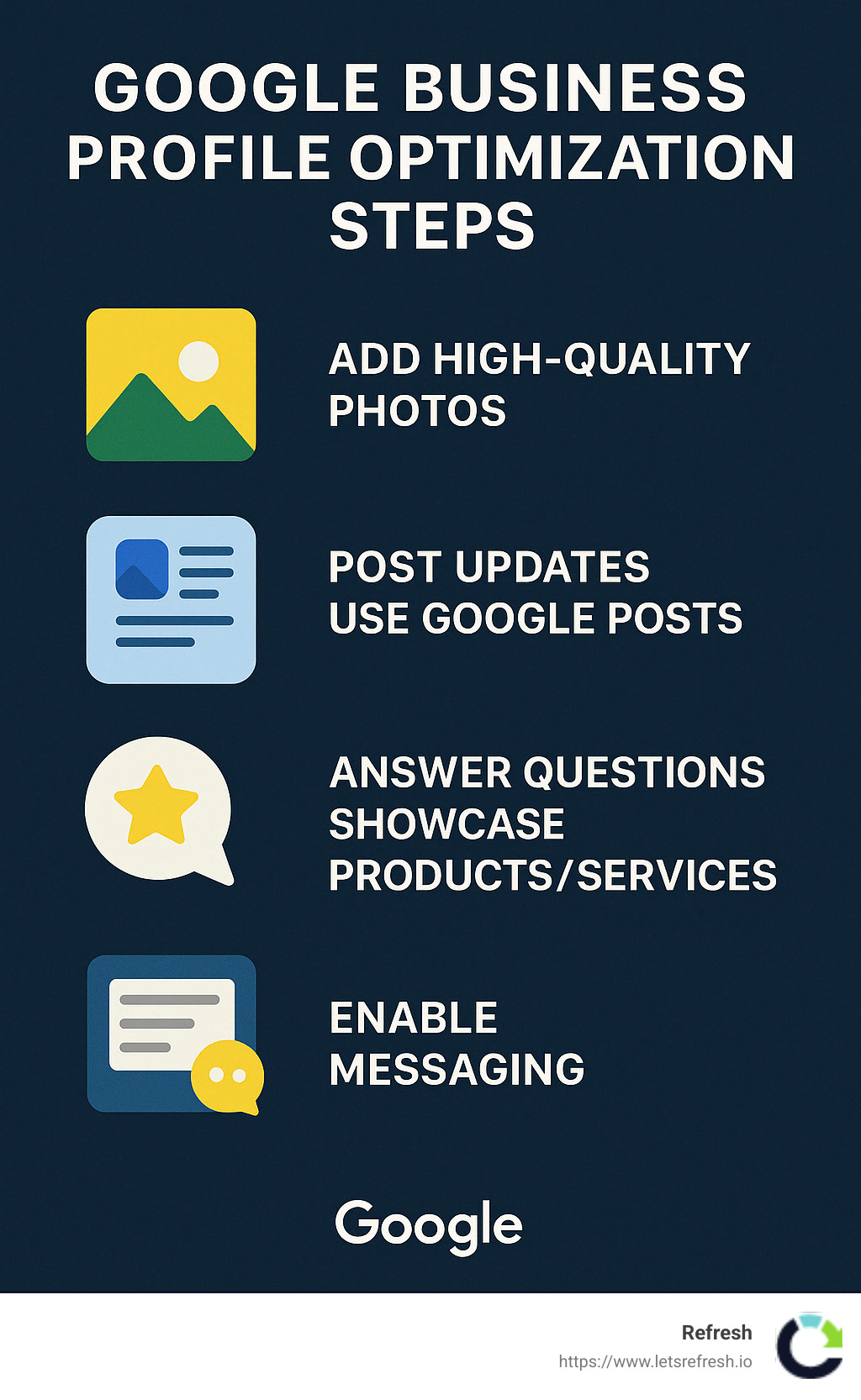
Want to dive deeper into optimizing your local visibility? Check out our handy guide: More info about Local SEO Strategy.
The Role of Online Reviews in Local SEO
Online reviews aren't just a way to boost your ego after a particularly good day—they're a powerful aspect of SEO for local business. In fact, they heavily influence both your customers' buying decisions and your ranking on Google.
When it comes to local SEO, reviews matter—a lot. Here's why:
First, Google considers reviews a direct ranking factor. The number of reviews you have, how recently they were posted, and their overall quality all tell Google that your business is trustworthy and relevant. This helps Google decide whether or not to boost your visibility in local search results.
Next up, reviews can significantly increase your click-through rates. When customers see a business listing glowing with lots of positive reviews and high star ratings, they naturally gravitate towards it. After all, wouldn’t you rather visit a pizza place rated 4.7 stars over one rated 3.2?
Additionally, reviews serve as critical trust signals for potential customers. A whopping 95% of people read online reviews before making a purchase decision. And here's a fun (and profitable!) fact: businesses with a star rating of 4.5 or higher earn up to 28% more revenue than those with a rating of 3.5 stars. Simply put, better reviews equal better business.
And finally, reviews often include keyword-rich content naturally. Happy customers frequently mention specific services or products, locations, and other relevant details. This helps Google connect your business with relevant search terms, further boosting your local SEO success.

Managing Online Reviews Effectively
Now that you're clear on the value of reviews, how exactly do you manage them effectively?
Encourage reviews proactively. Don't just cross your fingers and hope happy customers leave reviews. Train staff to politely ask satisfied customers to share their experiences. It might feel awkward at first, but trust me—most customers are happy to help out a business they love.
You can make asking part of your checkout process, or send a friendly follow-up email containing a direct link to your Google Business Profile. Consider adding subtle reminders at your physical location too—think receipts, signage, or table cards. Just don't get too pushy, and never offer incentives—incentivized reviews violate Google's guidelines and could lead to penalties.
Once you start receiving reviews (hooray!), respond to every single one, positive or negative. Yes—even the negative ones. For positive reviews, thank your customers warmly and reiterate the high points they mentioned. For negative reviews, apologize sincerely, offer a solution or invite them to contact you offline. Believe it or not, carefully handled negative reviews can actually boost your credibility by showing potential customers you genuinely care.
Monitoring your reviews regularly is key. Don't neglect platforms beyond Google like Yelp, Facebook, Better Business Bureau, and industry-specific review sites. You can use tools like Google Alerts, specialized review management software, or simply schedule a weekly check-in. Staying proactive ensures you won't miss an opportunity to engage with your customers.
Finally, reviews aren't just a ranking tool—they're also valuable business feedback. Pay attention to common themes or recurring complaints. This can help you pinpoint areas to improve and keep your customers happy.
“50% of smartphone users visited a store within a day of their local search.” – Google
This powerful statistic illustrates the direct connection between local searches, customer reviews, and real-life store visits. Clearly, managing your online reputation through reviews plays a crucial role in turning online searches into actual customers walking through your doors.
For more guidance on effectively leveraging SEO for local business, check out our post on SEO Marketing for Small Business.
Local Keyword Research and On-Page Optimization
You've probably heard the phrase "content is king." Well, in SEO for local business, the right keywords are the crown jewels. Finding and using the best local keywords can help you attract customers who are actively searching for your products or services online—and are close enough to visit your business.
Here's how to find those golden local keywords and optimize your website to rank for them effectively.
Finding Local Keywords
Local keywords are simply search terms that signal location. They're crucial in guiding search engines and customers to your doorstep. Common examples include phrases containing city names ("bakery in Pittsburgh"), near me searches ("coffee shops near me"), or even notable local landmarks ("restaurant near PNC Park").
So how do you find these valuable keywords?
Start off by using handy keyword research tools. Google's free Keyword Planner is a great place to begin. It lets you filter keywords by location, showing how often people in your city or area search for specific terms. If you want deeper insights, tools like Semrush or Ahrefs let you see which keywords your local competitors rank for, giving you fresh ideas to target.
Speaking of competitors—don't be shy! Take a peek at their websites. Pay special attention to keywords in their title tags, meta descriptions, headers, and even their website content. This quick research can inspire you and help you identify gaps you can fill.
Believe it or not, Google can also help you directly. When you start typing a service and location into Google's search bar, its Autocomplete feature suggests common related searches. These suggestions are real queries from actual users. You can also look at Google's "People Also Ask" and "Related Searches" sections at the bottom of the results page for additional keyword ideas.
And don't overlook voice search! More and more people use voice assistants like Siri or Alexa to ask questions such as, "Where can I find the best pizza in Cleveland?" Adding conversational, natural-language phrases to your keyword strategy can help you show up prominently for these increasingly popular searches.
On-Page Optimization for Local SEO
Now you've got your local keywords—what next? It's time to sprinkle them strategically throughout your website content. Here's how to optimize your site effectively to improve your local visibility and rankings.
Your title tags are the first thing a user sees when your site pops up on Google, so make them count. Include your primary local keyword naturally in your titles—for example, "Trusted Plumbing Services in Charlotte, NC | Refresh Plumbing." Keep your titles under 60 characters to ensure they display fully in Google's search results.
Next up are your meta descriptions. While these don't directly influence rankings, a compelling description that includes your local keyword encourages clicks. For instance: "Looking for expert plumbing services in Charlotte? Refresh Plumbing offers 24/7 emergency repairs—call us today!"
Headers (the bigger, bolded text that introduces page sections) are also important. Your main header (H1) should clearly state your primary keyword and service, like "Top Wedding Photography in Pittsburgh." Use your smaller headers (H2, H3) to mention specific neighborhoods or nearby areas you serve, reinforcing local relevance.
Don't forget your website URL. Including your keyword and location makes it easy for users and search engines alike. A clear URL like "yourdomain.com/services/wedding-photography-pittsburgh" helps signal exactly what your page is about.
In your actual content, naturally weave in mentions of your targeted neighborhoods, local landmarks, or city-specific events to clearly signal your local relevance. For instance, highlight your service areas: "Our plumbing team covers neighborhoods from Highland Park to Southside Flats."
Images also offer a great opportunity for optimization. Instead of default filenames (like IMG12345.jpg), rename your images with descriptive, keyword-rich filenames—such as "cleveland-pizza-restaurant.jpg." Add alt text to your images that also includes location keywords when relevant. This helps image searches lead customers straight to your site.
To further improve your site's visibility, consider implementing structured data called schema markup. Schema helps search engines better understand your business details, such as your address and phone number. Using LocalBusiness schema, Organization schema, and Address schema can help you stand out in search results through improved snippets.
Finally, ensure your website offers a stellar experience on mobile devices—this is crucial for local SEO. Most local searches happen on smartphones. Your site should load quickly, have easy navigation, clickable phone numbers, and mobile-friendly contact forms. Google's mobile-first indexing means your site's mobile performance directly impacts your local rankings.
With targeted keyword research and smart on-page optimization, you're setting yourself up to dominate local searches—and bring more eager customers right through your door.
For more tips and insights, check out our related guide: SEO for Service-Based Business.
Building Local Citations and Backlinks
When it comes to SEO for local business, citations and backlinks work like digital word-of-mouth for your company. They tell search engines, "Yes, this business is legitimate, trusted, and an established part of the local community." Let's explore how you can build these powerful signals to boost your local visibility.
Understanding Local Citations
Think of citations as your business's digital footprint across the web. Each time your business name, address, and phone number (NAP) appears online, you're creating a citation. These mentions help search engines verify that your business is real and that your information is accurate.
Citations can appear in many places:
Business directories like Yelp and Yellow Pages are the classic examples, but your information might also appear on social platforms like Facebook and LinkedIn, industry-specific directories (like TripAdvisor for restaurants or Healthgrades for medical practices), your local chamber of commerce website, and community news sites.
The golden rule of citations? Consistency is everything. If your address is listed as "123 Main Street" on your website but "123 Main St." on Yelp, search engines might get confused. These small inconsistencies can actually hurt your local rankings.
Building and Managing Citations
Start by taking inventory of where your business is already listed online. Tools like Moz Local or BrightLocal can help you find existing citations and spot any inconsistencies.
Once you know where you stand, focus on cleaning up incorrect listings. This might mean updating outdated information or removing duplicate listings. It's like digital housekeeping—not the most exciting task, but absolutely essential.
With your existing citations cleaned up, it's time to build new ones. Start with the heavy hitters:
Google Business Profile should be your first priority, followed by Bing Places, Apple Maps, Yelp, Facebook, and the Better Business Bureau. Then expand to industry-specific directories relevant to your business.
When submitting your information, consistency is key. Use exactly the same format for your business name, address, and phone number everywhere. And whenever possible, include additional helpful information like your website URL, business hours, and a compelling description.
"NAP consistency across all platforms is critical for building trust with search engines and improving local search rankings." - Miriam Ellis, Local SEO Expert
Strategies for Earning Quality Local Backlinks
While citations establish your business's existence, backlinks—links from other websites to yours—signal your authority and relevance. For local businesses, focusing on quality local backlinks can dramatically improve your visibility in search results.
Local business associations offer some of the easiest opportunities for quality backlinks. When you join your chamber of commerce, participate in business improvement districts, or become a member of industry associations, you'll typically receive a directory listing that includes a link back to your website.
Sponsoring local events and organizations is another powerful strategy. Whether it's a community festival, charity event, school program, or local sports team, your sponsorship usually comes with recognition on their website—including a valuable backlink.
Creating local resource content can naturally attract links. Consider developing neighborhood guides, comprehensive lists of local attractions, or industry resources specific to your city. When you create genuinely useful content with a local focus, other websites will want to link to it.
Guest blogging for local publications puts your expertise on display while earning backlinks. Reach out to community blogs, local news websites, and industry publications with a local angle to offer valuable content they'd be happy to publish.
Local media coverage can generate powerful backlinks. Share newsworthy stories about your business milestones, offer expert commentary on local issues, or participate in community initiatives that might earn press coverage.
Partnerships with complementary local businesses create win-win opportunities. A wedding photographer might partner with venues, florists, and caterers, while a plumber could collaborate with electricians and HVAC services. These relationships often lead to mutual website linking and referrals.
Supplier relationships can be leveraged for backlinks too. If you use local vendors or suppliers, ask to be featured on their "clients" or "partners" page with a link back to your site.
Unlinked mentions represent low-hanging fruit. Set up Google Alerts for your business name to identify when you're mentioned online without a link. A friendly email asking the publisher to add a link to your website often does the trick.
With backlinks, quality trumps quantity every time. A few links from trusted local sources will have far more impact than dozens of links from obscure, low-quality websites. Focus on building relationships within your community, creating valuable content, and participating in local initiatives—the backlinks will follow naturally.
By methodically building citations and earning quality local backlinks, you'll strengthen your business's online foundation and improve your visibility in local search results. These efforts compound over time, gradually establishing your business as a trusted local authority in both the eyes of search engines and potential customers.
Creating Locally Relevant Content
Creating content that resonates with your local audience is like having a friendly conversation with your community. It not only helps your website rank higher for important local searches but also positions your brand as a trusted and engaged member of the neighborhood. Done well, this kind of content becomes a valuable resource that customers appreciate—and search engines reward.
Types of Locally Relevant Content
When thinking about content for SEO for local business, it's smart to start with what's happening right around you. Sharing insights about local news and events instantly makes your business feel connected and in-the-know. For instance, if you own a popular Pittsburgh diner, you might share content like "The Best Places to Eat Before a Steelers Game" or "Your Ultimate Guide to Pittsburgh Restaurant Week." These pieces not only attract hungry customers—they highlight your local expertise.
Another powerful way to connect is to create location-specific service pages custom to each neighborhood you serve. A Cleveland roofing company, for example, could build dedicated pages like "Storm Damage Roof Repair in Parma" or "Expert Shingle Replacement in Lakewood." These focused pages address local customer challenges directly, making visitors feel seen and understood. Plus, Google loves clear, targeted content that directly matches local search queries.
Don't be afraid to share your expertise in detailed local resource guides, either. Whether it's "The Complete Guide to Charlotte's Greenway System" or "Pittsburgh Homebuyer's Neighborhood Comparisons," useful guides establish your business as a helpful and authoritative local voice. When you offer genuine value, customers remember you next time they need your services.
People love feeling seen and appreciated, so highlighting local businesses, partners, or customers through community spotlights can go a long way. Tell stories about customer successes, feature interviews with fellow local entrepreneurs, or showcase your own team volunteering for community events. This kind of authentic local storytelling builds both goodwill and loyalty.
Another excellent content idea to boost your SEO is creating local FAQ pages that answer specific questions your community regularly asks. For instance, "How Often Should I Service My HVAC System in Charlotte's Climate?" or "What Permits Do I Need for Home Renovation in Pittsburgh?" Answering these common local queries positions you as the knowledgeable go-to expert—precisely what customers want and search engines reward.
Best Practices for Local Content Creation
When creating your locally-focused content, keep readability and value front and center. Use your local keywords naturally—like a friendly conversation rather than keyword stuffing. Google and your readers will thank you for content that sounds human, not robotic.
Adding structured data markup (schema markup) helps search engines understand that your content has a local focus, boosting your chance of appearing prominently in localized searches. Consider also structuring your articles clearly and concisely to optimize for featured snippets—those helpful answers Google displays right at the top of search results.
Make your content highly shareable by crafting posts that locals genuinely find useful or entertaining. Include original photos from recognizable local landmarks or events, as this visual connection boosts engagement and authenticity. And speaking of authenticity, don't forget to regularly refresh and update your content. Google favors fresh, timely content—and your readers do too.
Finally, showcase your genuine community involvement and customer stories to illustrate that you're not just doing business in the neighborhood—you're part of it. At Refresh, we've seen how much locally relevant content can boost SEO for local businesses. One of our Pittsburgh-based home services clients saw their organic traffic soar by 165% simply by consistently publishing locally-focused guides, seasonal maintenance tips custom specifically to Pittsburgh, and heartwarming spotlights on community projects they proudly supported.
When done right, creating local content isn't just good SEO practice—it's a meaningful way to build lasting connections and trust with your community.
For more tips on strengthening your local search visibility, check out our helpful guide on SEO for Service-Based Business.
Tracking and Measuring Your Local SEO Success
You've put time and effort into your SEO for local business strategy—great! But how do you know if it's actually working? Tracking and measuring your results is the key to understanding what's going well and what needs some fine-tuning.
Let's dive deeper into how you can effectively track, measure, and improve your local SEO efforts over time.
Key Performance Indicators (KPIs) for Local SEO
To truly understand your progress, you'll want to keep an eye on certain "must-watch" metrics. These key performance indicators (KPIs) give you clear signals about how your local SEO strategy is performing:
1. Local search rankings: Monitor your rankings for target local keywords. Pay attention to your visibility in Google's Local Pack and your position in Google Maps results. Seeing your business climb these results is a sign your local SEO strategy is paying off.
2. Google Business Profile insights: Your Google profile provides a wealth of useful data. Track metrics such as profile views, clicks to your website, phone calls, and direction requests. Even small increases in these numbers can lead to significant growth over time.
3. Website traffic from local searches: Check how much organic traffic is coming from local searches. Also, look at how users behave on your local landing pages—are they staying longer, bouncing less, and visiting multiple pages? These behavioral signals help you understand how engaging your content is.
4. Conversion metrics: Local SEO success translates to new customers and sales. Track contact form submissions, online bookings, phone calls, and even in-store visits that originated from local searches. Increased local conversion rates are the ultimate proof that your strategy is working.
5. Online review data: Reviews are a crucial part of local SEO, so keep tabs on the number and quality of your reviews. Look at average star ratings, total number of new reviews, and how quickly and effectively your team responds. Positive trends here indicate growing trust and credibility.
Tools for Tracking Local SEO Performance
To gather and analyze the data you need, there are some handy (and mostly free!) tools available:
- Google Analytics: This essential tool helps you track local traffic and user behavior. With Analytics, you can easily segment visitors by location, track conversions, and see how local pages are performing.
- Google Search Console: Think of this as your behind-the-scenes view into how your local keywords perform. Search Console shows you click-through rates, impressions, mobile usability issues, and how well your local pages are indexed.
- Rank tracking tools: Specialized tools like Moz Local, BrightLocal, or Semrush let you precisely measure how your business ranks in local searches. They'll show you your position in the Local Pack, Maps rankings, and even featured snippets.
- Google Business Profile insights: Built-in analytics from Google let you assess how customers interact specifically with your Google listing, including calls, directions, and website clicks.
- Review monitoring tools: Tools like BrightLocal help you track and manage reviews across multiple sites, ensuring you never miss important customer feedback.
Using Data to Refine Your Local SEO Strategy
Once you're set up to track everything, it's time to use that valuable data to make smart improvements:
Start by identifying high-performing keywords that bring in the most traffic and conversions. Put extra resources into ranking better for those terms and finding similar opportunities.
Look closely at underperforming local landing pages. High bounce rates or low conversions usually mean there's room for improvement. Update content, improve calls-to-action, or make pages more user-friendly.
Keep your eyes open for new local search opportunities. Are there emerging keywords or locations you haven't targeted yet? Expanding to these areas can capture valuable new customers.
Use insights from your Google Business Profile to learn what's resonating with visitors. If certain types of posts or photos are generating more engagement, do more of those.
When it comes to reviews, notice any common themes or complaints. Addressing these issues proactively not only boosts your online reputation but usually translates directly into happier customers and better reviews.
Lastly, analyze which local content performs best. If certain guides or blog posts are getting lots of traffic, create similar helpful content to keep visitors coming back for more.
Local SEO isn't a one-and-done type of project. It's an ongoing cycle of refining, measuring, and adjusting based on what the data shows you. At Refresh, we've seen how making data-driven tweaks can significantly boost results.
One of our small business clients in Charlotte saw amazing results just by making a few tweaks based on their analytics. They noticed their "emergency plumbing services" page drove the highest-value customers. By creating more targeted content around that topic, their lead generation rose by a whopping 210%.
The reality is, tracking and measuring your SEO for local business success doesn't just show you what's happened—it points the way toward even greater growth.
Frequently Asked Questions about SEO for Local Business
What is the most important factor in local SEO?
When it comes to SEO for local business, your Google Business Profile is hands-down the most critical factor for getting noticed in local search results. Think of this profile as your digital storefront—it’s often the first thing customers see when looking for businesses nearby.
In fact, optimizing your Google Business Profile accounts for roughly 33% of your ranking power in local searches. To make your profile work for you, focus on providing complete and accurate information, choosing relevant categories, and regularly posting engaging updates. Adding high-quality photos and videos, along with encouraging and responding to positive reviews, also makes a huge difference in boosting your visibility.
Of course, local SEO involves several interconnected parts. Your citations, backlinks, and on-page content all play important roles. But if you're wondering where to start, making your Google Business Profile shine is your best bet.
How long does it take to see results from local SEO efforts?
While we'd love to say "tomorrow," the truth is SEO for local business isn't instant—but it's usually quicker than traditional SEO.
Typically, updates to your Google Business Profile show up pretty fast—within 1-3 days. Within about 4-8 weeks, you might start noticing improved visibility in local search results, especially if your industry or area isn't extremely competitive. For most businesses, significant improvements like better rankings, increased web traffic, and more customer contacts start kicking in around the 3-6 month mark.
If you're in a highly competitive area or industry, reaching top spots for popular keywords might take 6 months or more. Factors like your current online presence, quality of optimization, and how tough the competition is all impact your timeline.
The key to success with local SEO is consistency and patience. Keep optimizing, measuring results, and tweaking your strategy—you'll get there!
Can I do local SEO myself, or do I need to hire an expert?
Good news—you can absolutely tackle certain aspects of SEO for local business yourself! Tasks like setting up your Google Business Profile, ensuring your business info (NAP) is accurate everywhere, encouraging customer reviews, creating straightforward local content, and submitting your business to key directories like Yelp or BBB are all manageable.
But let's be real—some technical and time-intensive tasks may be better left to someone who lives and breathes SEO. Things like schema markup, large-scale citation audits, detailed backlink building, advanced website fixes, and analytics can be trickier. If tech stuff makes your eyes glaze over, you're not alone. Doing everything yourself may become overwhelming pretty quickly.
A hybrid approach often works wonders. You can handle the basics yourself to get started, then hire experts like our team at Refresh to take care of the tougher, more technical tasks or to develop a more targeted local SEO strategy. As your business grows, you might decide that a full-service solution makes sense, freeing up your time to focus on running your business.
At Refresh, we're flexible. We offer everything from strategic guidance to comprehensive local SEO management, customized to your specific needs and goals. Our mission is to partner with you long-term, ensuring your local SEO strategy consistently delivers meaningful results.
Feel free to reach out and explore how we can help your business stand out locally—we'd love to chat!
Conclusion
Mastering SEO for local business isn't just another marketing tactic—it's essential for your small business to thrive. In today's digital-first world, being easily found online by local customers can mean the difference between busy foot traffic and the sound of crickets.
Throughout this guide, we've explored what it takes to make your local presence shine. From optimizing your Google Business Profile (think of it as your digital storefront) to managing your online reputation through customer reviews, everything connects to create a strong local brand.
Maintaining consistent NAP (Name, Address, and Phone number) information across every online platform might not sound glamorous—but trust me, search engines love consistency almost as much as your customers do. Local keywords help your website speak directly to nearby audiences, while citations and backlinks build credibility by showing Google your business is an active, trusted member of your community.
We also talked about creating meaningful content that's custom to your local audience—think local guides, community events, and answers to common local questions. This not only improves your ranking in search results but also positions you as an engaged and trustworthy local authority.
But implementing these strategies is only half the battle. Tracking and measuring your local SEO success is critical. Regularly checking your local rankings, analyzing web traffic, and reviewing customer engagement helps you understand exactly what's working—and what needs adjusting.
At Refresh, we've seen the incredible results a well-executed local SEO strategy can deliver for small businesses in Pittsburgh, Cleveland, Charlotte, and beyond. Our clients have enjoyed:
- A 120% increase in organic search visibility
- 165% growth in local website traffic
- A 210% boost in qualified local leads
Pretty amazing, right?
We know navigating the ins and outs of local SEO can feel overwhelming—especially when you're busy actually running your business! That's why we created specialized SEO for Small Business Packages. They're designed to give you the support you need—whether that's comprehensive strategy, technical SEO help, or ongoing content creation.
At Refresh, we believe in long-term partnerships—not quick fixes. We combine enterprise-level SEO expertise with personalized, hands-on support that feels more like working with a trusted friend than a faceless agency. We're here to cheer you on, offer guidance, and celebrate your successes right alongside you.
Ready to take your local SEO to the next level? Contact our team at Refresh today. We'd love to discuss your goals and help you connect with more local customers.
When it comes to local visibility, being seen equals success. Let's make sure your business is the one customers find first.
Still have questions? Let’s talk about it.
.avif)

